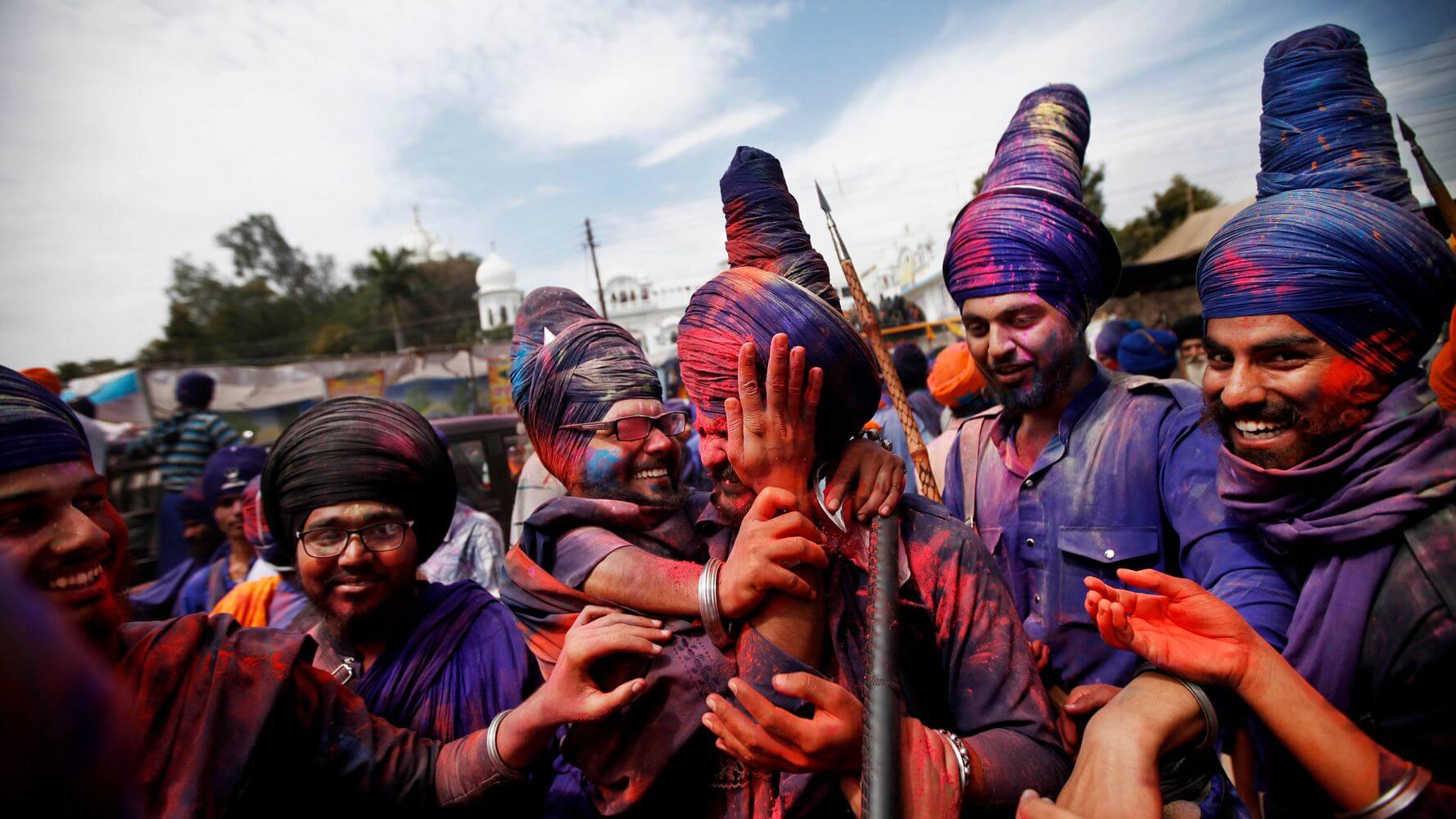Sikhs do not traditionally celebrate Holi due to its association with Hindu religious beliefs and practices. Holi is a vibrant and joyous festival celebrated primarily by Hindus in India and across the world.
Also known as the Festival of Colors, Holi marks the arrival of spring and the triumph of good over evil. During this festival, people gather, play with colors, sing and dance, and exchange sweets and gifts. However, unlike Hindus, Sikhs, who follow their own distinct religion, do not traditionally celebrate Holi.
This is because Holi is deeply rooted in Hindu mythology and rituals, and Sikhs focus on their own religious observances and festivals such as Vaisakhi and Gurpurab. Despite this, Sikhs may participate in Holi celebrations as a way to promote unity and harmony among different communities.
The Origin And Meaning Of Holi In Sikhism
Holi, a Hindu festival of colors, holds historical significance in Sikhism as well. Sikhism originated in Punjab, where Holi is widely celebrated. The festival’s meaning in Sikhism goes beyond the traditional festivities, embodying deeper spiritual and historical connections. Historically, Holi symbolizes the triumph of good over evil, and in Sikhism, it commemorates the bravery of Guru Gobind Singh and the Sikh warrior spirit.
The festival also marks the arrival of spring and celebrates the oneness of humanity. Although Holi is not a Sikh festival per se, it is embraced by many Sikhs as a reflection of the vibrant cultural traditions of Punjab. Thus, connections between Holi and Sikh festivals can be seen through their shared roots and the values they uphold.
Holi Celebrations In Sikh Communities
Sikhs do celebrate Holi, albeit with unique rituals and traditions specific to their culture. In Sikh communities, Holi is viewed as a time for joyous celebration and spreading love and unity. While the festival retains its essence of color and vibrancy, Sikhs also incorporate their beliefs and values.
The cultural adaptations of Holi in Sikhism showcase the fusion of their religious practices with the festive spirit. Sikhs partake in special congregations and prayers, emphasizing the teachings of their Gurus. During Holi, they focus on promoting equality, social justice, and service to humanity.
The festival offers them an opportunity to strengthen their sense of community and reinforce the principles that are central to Sikhism. Sikhs also use this occasion to reflect on the divine presence and express gratitude for the blessings in their lives.
By embracing Holi, Sikh communities ensure that their celebrations are rooted in their faith and customs.
Holi Customs And Rituals: Sikh Perspective
Sikhs do not traditionally celebrate Holi, the popular Hindu festival of colors. However, they do have their own colorful traditions and rituals. One such ritual is the Holika bonfire, which holds significant symbolism for Sikhs. The bonfire is lit to commemorate the victory of good over evil, and it represents the triumph of Sikhism’s values.
In Sikhism, colors also hold great importance. They are believed to reflect the different virtues and emotions that individuals possess. For example, the color blue signifies bravery and truth, while red represents passion and sacrifice. These colors are incorporated into the Sikh turban, known as the “dastaar,” which is worn by both men and women.
So, while Sikhs may not partake in the festivities of Holi as practiced by Hindus, their customs and rituals hold their own significance and meaning.

Credit: en.wikipedia.org
Holi And Sikh Philosophy: Deepening The Understanding
Sikhs celebrate Holi, embracing its ethical and spiritual aspects. Sikh teachings emphasize unity, love, and compassion. During Holi, Sikhs come together to celebrate the vibrant festival of colors in a spirit of togetherness. Holi signifies the triumph of good over evil and the arrival of spring.
It is a time for Sikhs to deepen their understanding of Sikh philosophy and connect with their spiritual beliefs. They engage in community gatherings, sing hymns, and share festive meals. The colorful celebrations reflect the Sikh principles of equality, oneness, and service to humanity.
By participating in Holi, Sikhs reinforce their commitment to living a life of righteousness and embracing the values taught by their Gurus. It is a joyous occasion that brings Sikhs closer to their faith and strengthens the bonds of unity among the community members.
Incorporating Holi Into Sikh Identity And Culture
Holi is a festival that holds significance for Sikhs as it has been incorporated into their identity and culture. The celebration of Holi among Sikhs not only represents their love for colors and joyful festivities but also plays a vital role in fostering community bonds.
Sikhs see Holi as a means of cultural expression, especially for the Sikh diaspora spread across the globe. This vibrant festival allows Sikhs to come together, celebrate their shared heritage, and strengthen their sense of belonging. Holi acts as a unifying force among Sikhs, transcending geographical boundaries and bringing them closer as a community.
The rich symbolism and joyous nature of Holi make it an integral part of Sikh culture, allowing them to embrace their traditions and forge connections with fellow Sikhs worldwide.
Attitudes And Perspectives: Sikhs And Holi
Sikhs have diverse viewpoints on celebrating Holi, a festival traditionally associated with Hinduism. Some Sikhs fully embrace the celebration, considering it a joyful occasion to come together with friends and family. They enjoy the vibrant colors, music, and dance that are a prominent part of Holi.
Others, however, take a more reserved stance, choosing not to participate in the festival due to its historical association with certain caste practices or the belief that it conflicts with Sikh principles and values. These differing perspectives within the Sikh community can be attributed to varying interpretations of Sikhism and personal beliefs.
By exploring the reasons behind these different stances on Holi, we can gain a deeper understanding of the complex attitudes and perspectives within the Sikh community regarding this festival.
Frequently Asked Questions For Do Sikhs Celebrate Holi
Are Sikhs Allowed To Celebrate Holi?
Yes, Sikhs are allowed to celebrate Holi, an important festival of colors in Hindu culture.
What Do Sikhs Do On Holi?
Sikhs celebrate Holi by coming together for joyful gatherings and engaging in vibrant color play.
Why Don’t Sikhs Celebrate Holi?
Sikhs don’t celebrate Holi because it is not a part of their religious practices.
Conclusion
In Sikhism, the celebration of Holi varies among different Sikh communities. While some Sikhs do participate in Holi festivities, others choose not to based on their own personal beliefs and values. Ultimately, the decision to celebrate Holi as a Sikh is a personal one, influenced by cultural, social, and religious factors.
Sikhs generally prioritize the principles of equality, service, and devotion to God above all else. As Holi is traditionally associated with the Hindu religion, some Sikhs may feel that participating in the festival goes against their religious teachings. However, Sikhism also emphasizes the importance of tolerance and respecting diverse beliefs.
Therefore, if Sikhs do choose to celebrate Holi, it is typically done in a manner that aligns with their Sikh identity and values. Overall, the celebration of Holi among Sikhs is a complex and individualistic matter, shaped by a variety of factors within the Sikh community.



